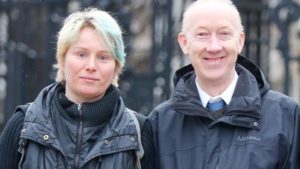Judicial Review of NI Exclusion from Spycops Inquiry

Jason Kirkpatrick & Kate Wilson were both spied on by Mark Kennedy. Belfast High Court, 7 February 2017
A judge at Belfast High Court gave permission yesterday for a Judicial Review of the Home Secretary’s insistence that the Pitchford Undercover Policing Inquiry (UCPI) should not consider activities of police spies in Northern Ireland.
The case was brought by Jason Kirkpatrick, an anti-globalisation activist who is a Core Participant in the UCPI because he was spied on by Mark Kennedy in England.
However, Kennedy also spent more significant time spying on Kirkpatrick in Scotland, Northern Ireland, the Republic of Ireland and Germany. He has been told that although he can give evidence on that to the Pitchford inquiry if he wants, it will not be followed up, and it will not be included in the Undercover Policing Inquiry report because the terms of reference only cover England and Wales.
His legal representatives, Darragh Macken from KRW Law and Ben Emmerson and Jude Bunting of Doughty Street, argued that it is absurd for Pitchford to investigate the activities of officers such as Mark Kennedy in England and Wales but for that investigation to simply stop at the border when he enters Northern Ireland and restart again when he gets back to England or Wales.
This argument has been supported by two different Northern Irish Ministers of Justice who have written to the Home Secretary stating that it is ‘imperative‘ that the inquiry be able to follow the evidence of the activities of undercover officers working for UK units such as the Special Demonstration Squad (SDS) and the National Public Order Intelligence Unit (NPOIU) if they are found to have crossed into Northern Ireland.
The court then heard that the Police Service of Northern Ireland (PSNI) have now been told by the Metropolitan Police in London that officers from the SDS and NPOIU entered Northern Ireland on a number of occasions and also spied on the families of people murdered in Northern Ireland.
At least one Northern Irish family has already been approached by the Metropolitan Police to inform them officers from the SDS attended demonstrations supporting their campaign, and another family will be contacted soon.
PSNI’s Assistant Chief Constable Mark Hamilton says they were ‘completely blind’ to the fact that that undercover officers from these controversial undercover units were even entering Northern Ireland, let alone spying on political activists there. This raises serious questions about authorisation and accountability, as well as the dangers officers put themselves and others in. Hamilton described the deployments as ‘an act of madness’.
The PSNI have now reviewed thousands of documents provided by the Met relating to activities of these officers in Northern Ireland of which, they say, they were previously unaware, and there is still a lot of material to review. They warned that there is a possibility some of those activities may have implications for legacy investigations into the Troubles. Because of this, the PSNI has also written to the Home Secretary to say that the terms of reference of the Pitchford Inquiry must be opened up to include Northern Ireland.
Ben Emmerson QC bluntly accused the Home Office of taking a ‘brass monkey attitude’ of ‘see no evil, hear no evil, speak no evil – just turn a blind eye’ and described their decision-making process as ‘hopeless… flawed from the top to bottom and frankly embarrassingly bad’.
For their part, counsel for the Home Secretary appeared to have little to say, although they did claim that there is no need to expand the terms of reference. Apparently they believe the Pitchford Inquiry was not set up to consider ‘every specific incident’, and that the terms of reference only require it to look at ‘more general, systemic issues’, for which, counsel claimed, a few examples of incidents from England and Wales would be sufficient.
Letters from the Home Office also indicated that the ‘particular history of Northern Ireland’ means that extending the investigation to Northern Ireland could be ‘costly’ and is ‘not in the public interest’.
The judge, Mr Justice Maguire, seemed to disagree, and granted leave to have a full Judicial Review, which will take place in about 10 weeks’ time.
He commented that perhaps, in the future, the Home Office will be able to provide compelling reasons why they should not open the inquiry up to include this jurisdiction. They certainly did not manage to do so yesterday.
All this raises the question of Scottish inclusion in the Pitchford Inquiry. The majority of known spycops were in Scotland. Every party in the Scottish Parliament backed their government’s call to be covered by the Inquiry, but the Home Office refused.
The Scottish government responded by commissioning a whitewash from HM Inspectorate of Constabulary in Scotland. This self-investigation by police, including those implicated in undercover work, could scarcely be less credible, even before the government restricted it to only looking at the last few years of police spying.
It has been derided by campaigners who insist that if abuses are serious enough to warrant a proper public inquiry in England and Wales then they must not be ignored elsewhere. Scottish eyes will be watching Belfast in ten weeks’ time.
